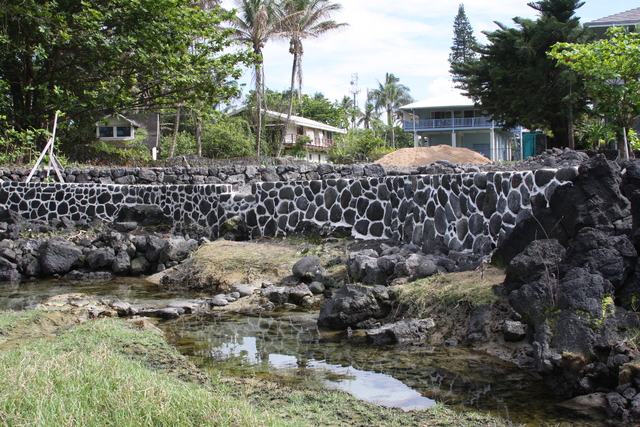The state Department of Land and Natural Resources says it is responding to complaints over a seawall built on the shore of Hilo’s Lalakea pond.
The state Department of Land and Natural Resources says it is responding to complaints over a seawall built on the shore of Hilo’s Lalakea pond.
The Hawaii County Department of Parks and Recreation authorized the reconstruction of the rock-and-mortar wall through a “Friends of the Park” agreement with an adjacent landowner. The shoreline area is considered part of Leleiwi Beach Park.
But the work occurred without county special management area or state conservation district use permits. County Planning Department and DLNR officials say both were needed.
Planning notified Robert Iopa, the adjacent landowner, to halt work in March and sent a letter April 15 regarding the findings of a site inspection. The wall sits on both private and public land, according to a planning official.
DLNR spokeswoman Deborah Ward said in an email last week that the department is working with county planning to address the issue, noting a meeting is expected to occur this week.
The department takes a zero-tolerance approach to “unauthorized structures within the shoreline,” she said.
DLNR was not consulted about the wall’s construction, Ward said. Since more than half of the wall was rebuilt, it is considered a “major alternation,” requiring a conservation district use permit from the Land Board.
Iopa, a Honolulu architect, did not respond to an email and voicemail on his cellphone.
He received the parks agreement, also allowing him to replace up to five ironwood trees with two to three native trees on the shore, in December.
The Friends of the Park program was created to allow volunteers to help improve or beautify public park areas, assist in maintenance, combat vandalism and assist with enforcement of park rules.
Parks Director Clayton Honma said the wall was in disrepair and considered a safety issue. He didn’t know who originally built it.
Some environmentalists and beach users were alarmed by the reconstruction of the wall, which included backfill. They say it altered the shoreline and gives the impression of extending Iopa’s property line.
Hilo resident Ardena Saarinen questioned the public benefit.
“How exactly is cutting down the trees fronting one lot, changing the natural topography, and rebuilding a seawall with no cultural significance which now inhibits our ability to walk what little shoreline we have at Lalakea considered to be a public benefit?” she said in an email. “It was perfectly fine the way it was.”
Iopa received an SMA permit for the construction of a 5,500-square-foot home and other improvements, including dry-stack walls on his property. It did not include work on the existing shoreline wall.
A January response letter from Planning Director Duane Kanuha regarding the SMA application made note that repairs to existing stone walls on the makai boundary were proposed. But, since they required a “shoreline survey and additional information,” the repairs were not being considered at that time, he said.
The rock wall repairs commenced without the department’s notification.
Honma acknowledged the parks department did not instruct Iopa to consult with planning or DLNR.
In the April 15 letter, Kanuha noted the SMA did not allow for repairs to existing stone walls. Additionally, the letter said that other land alteration or construction activities within the 40-foot shoreline setback area not covered by the permit are prohibited without a shoreline setback variance from the county Planning Commission.
The letter also notes some of the work may have occurred makai of the shoreline.
Iopa, a Waiakea High School graduate who designed University of Hawaii at Hilo’s College of Hawaiian Language building, was asked to submit a shoreline survey as soon as possible.
He purchased the vacant parcel bordering the shoreline pond in 2012.
Email Tom Callis at tcallis@hawaiitribune-herald.com.

